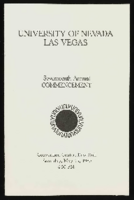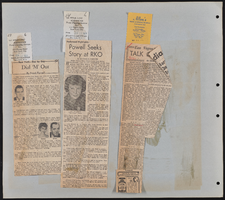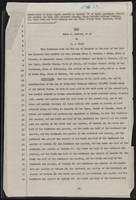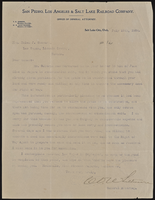Search the Special Collections and Archives Portal
Search Results

Sook-ja Kim, February 12, 1996 and April 6, 1996: transcript
Date
Archival Collection
Description
The Kim Sisters, composed of three sisters, Sook-ja, Ai-ja, and Mia, came from Korea to Las Vegas in February 1959. Their first contract in America was to perform at the Thunderbird Hotel for four weeks as part of the China Doll Revue, the main showroom program. This engagement led to a successful career. Their popularity reached was at its height at the end of the 1960s when they performed throughout the United States and Europe. Sook-ja Kim is the oldest of the sisters. After his sister Ai-ja died in 1987, Sook-ja teamed up with her two brothers and continued to perform until 1989. Now semi-retired from show business, with occasional performances in Korea, she is working as a real estate agent. In this interview, she talked about her childhood, her career, and the family she has built since coming to America. Sook-ja was born in 1941 in Seoul, Korea as the third child of seven in a musical family. Her father was a conductor and her mother, a popular singer. After the Korean War, her mother arranged to send the Kim Sisters to America. When they came to Las Vegas, there were virtually no Koreans in the area. They depended on each other to take care of themselves. Some of the difficulties they had to adjust to in American were language, food, and cultural differences. Over the span of almost forty years in America, Sook-ja became acculturated without discarding her ethnic identity of family priorities. Her life-long guiding principle has been to adopt certain American values while continuing to keep her cherished Korean ethnic values. Through their performances, the Kim Sister informed the audience about Koreans and their culture. As the oldest of the group, Sook-ja was entrusted the care of her sisters, and later her brothers, the Kim brothers. Once she settled in Las Vegas, she brought more than forty members of her extended family to the city, contributing to the growth of the Las Vegas Korean community.
Text

University of Nevada, Las Vegas (UNLV) 17th commencement program
Date
Archival Collection
Description
Commencement program from University of Nevada, Las Vegas Commencement Programs and Graduation Lists (UA-00115).
Text

Transcript of interview with Brad Nelson by Stefani Evans, October 30, 2017
Date
Archival Collection
Description
In 1984, with the advice of his father ringing in his ears, Brad Nelson uprooted his wife and two children from their Denver home and moved them to Henderson, Nevada, where he would begin a new adventure in shaping the new master-planned community of Green Valley with Mark Fine and American Nevada Corporation (ANC). Nelson, lifelong Nebraskan and only child of his parents, arrived armed with a Bachelor's degree in landscape architecture with urban planning option, a Master's degree in urban planning, and fifteen years of planning and executive experience with the national firm of Harmon, O'Donnell and Henniger Planning Consultants. He arrived in time to plan Green Valley's first village, the Village of Silver Spring. By the time he left ANC for Lake Las Vegas in 1999, his work was done and most large parcels had been sold. As Nelson puts it, by 1999 ANC was "out of land, and I'm a land guy." Lake Las Vegas had plenty of undeveloped land, so "land guy" Nelson a chief operating officer
Text

Transcript of interview with Fran Fine-Ventura by Barbara Tabach, March 4, 2015
Date
Archival Collection
Description
In this interview, Fine discusses her childhood as well as the path that led to her career in law, which included working on a presidential campaign in New York City as well as several legal secretary positions in Washington, D.C., Texas and California, before eventually receiving her law degree from Golden Gate University. In addition, she reflects upon working on the infamous Jeff MacDonald murder trial in the 1970s as well as her experience becoming?and ending her service as?a Family Court Judge. Fine also discusses her community service work, particularly with the Women?s Philanthropy Board of the Jewish Federation and with Temple Beth Am.
Frances-Ann "Fran" Fine-Ventura is an attorney at the Fine and Price Law Group in Las Vegas, Nevada. She was born September 28, 1951, in Cleveland, Ohio, and moved to Arizona at the age of eleven when her father sought new economic opportunities out West. Fine eventually moved to Las Vegas shortly after she graduated law school in 1983. Fine worked for the U.S. Attorney's Office in Nevada in the early 1980s, then at several private law firms. From 1992 to 1998, she served as a District Court Judge in the Family Division of the Eighth Judicial District Court. Fine is involved in the Las Vegas community via the Nevada School of the Arts and the Court Appointed Special Advocate (CASA) Foundation in Clark County, Nevada. She has also been involved with the Women's Philanthropy Board of the Jewish Federation of Las Vegas since 1984, and served as chair from 2014 to 2016. Fran Fine's brother is Las Vegas real estate developer Mark Fine. In this interview, Fine discusses her childhood as well as the path that led to her career in law, which included working on a presidential campaign in New York City as well as several legal secretary positions in Washington, D.C., Texas and California, before eventually receiving her law degree from Golden Gate University. In addition, she reflects upon working on the infamous Jeff MacDonald murder trial in the 1970s as well as her experience becoming?and ending her service as?a Family Court Judge. Fine also discusses her community service work, particularly with the Women?s Philanthropy Board of the Jewish Federation and with Temple Beth Am.
Text

Amber Diskin oral history interview: transcript
Date
Archival Collection
Description
Oral history interview with Amber Diskin conducted by Barbara Tabach on January 5, 2018 for the Remembering 1 October Oral History Project. In this interview, Amber Diskin discusses her experience at the Route 91 Harvest music festival during the October 1, 2017 mass shooting in Las Vegas, Nevada. Diskin talks about finding her way home after escaping the crowds and letting her family and friends know she was not hurt. She speaks of the aftermath of the shooting, including how her children were affected, the post-traumatic stress disorder she developed, and how the shooting has affected her love of concerts. As a native Nevadan, she shares her views of Las Vegas and how her sense of community deepened after this event. Diskin ends the interview by discussing her appreciation for the first responders and the gift baskets she helped distribute to hospitals, police stations, and the fire department.
Text
Ham, Artemus W., Sr., 1892-1970
Artemus W. “Art” Ham Sr. (1892-1970) was a highly respected Las Vegas, Nevada attorney and a philanthropist who devoted his work towards the Las Vegas community as well as the development of the Las Vegas strip. Ham was also president of the Las Vegas Chamber of Commerce in 1929 and a recognized supporter to the University of Las Vegas, Nevada (UNLV). He became active in the city’s real estate and had faith in the future of Las Vegas.
Person




